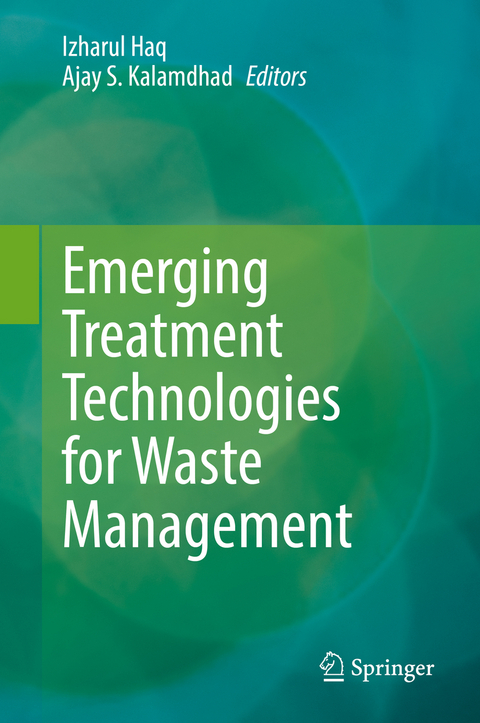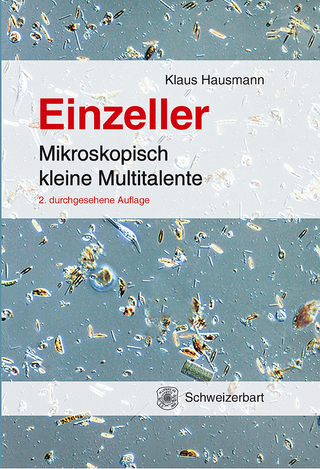
Emerging Treatment Technologies for Waste Management
Springer Verlag, Singapore
978-981-16-2014-0 (ISBN)
Dr. Izharul Haq-Editor Department of Civil Engineering, Indian Institute of Technology Guwahati-781039, India. Izharul Haq is currently working as Post Doctoral Fellow at the Department of Civil Engineering, Indian Institute of Technology Guwahati, India. He has completed his Post-graduation in Environmental Microbiology from BBA (Central) University, Lucknow, and Ph.D. in Microbiology from CSIR-Indian Institute of Toxicology Research, Lucknow, India. Dr. Haq has 3 years of research and teaching experience. He has been honored with the prestigious award “Young Scientist Award-2018” to recognize his scientific research. He has exposure in the field of bioremediation and detoxification of emerging pollutants from industrial wastewater using microbial approaches. He has published many research papers in reputed national and international journals with high impact factors. He also has published book chapters and magazine articles in reputed international books. Currently, Dr. Haq is editing the 4 books published by Springer-Nature and Elsevier. He has been presented several papers relevant to his research areas in national and international conferences. Dr. Haq has supervised 4 M Tech students in the Environmental Engineering field. He is life member of the Association of Microbiologists of India (AMI), The Biotech Research Society, India (BRSI), Indian Science Congress Association (ISCA) Kolkata, and Vigyan Bharti, India. Professor Ajay Kalamdhad-Editor Department of Civil Engineering, Indian Institute of Technology Guwahati-781039, India. Ajay Kalamdhad is working as a professor at the Department of Civil Engineering, Indian Institute of Technology Guwahati, Assam, India. He obtained his Bachelors, Masters, and Ph.D. in Civil and Environmental Engineering from GEC Jabalpur, VNIT Nagpur, and IIT Roorkee, respectively. Prior to joining IIT Guwahati, he was an Assistant Professor at VNIT Nagpur and worked on various projects at RRL, Bhopal (Now AMPRI, Bhopal), and NEERI, Nagpur.His research team is working on solid waste management by microbial and vermicomposting, aerobic and anaerobic digestion of kitchen waste and industrial sludge for biogas production, Composting of water hyacinth using different composting technologies. He also serves as an editorial board member/reviewer for several national/international journals of repute. Currently, Prof Kalamdhad is supervising 18 Ph.D. and 11 M Tech students, and more than 10 Ph.D. and 35 M Tech dissertations have been completed under his supervision. In addition, Prof. Kalamdhad has handled 9 major R&D projects funded by various agencies. He has published more than 150 research papers in national and international journals of repute. He also has published 6 book chapters and 5 international books. He is a life member of Indian Public Health Engineers, Asia-Pacific Chemical, Biological& Environmental Engineering Society, National Solid Waste Association of India, International Solid Waste Association, and Indian Water Works Association.
Chapter 1. Recent advances in physicochemical and biological approaches for degradation and detoxification of industrial wastewater.- Chapter 2. Bioremediation of Hexavalent Chromium from industrial effluents.- Chapter 3. Integration of nanotechnologies for sustainable remediation of environmental pollutants.- Chapter 4. Arsenic removal using nanotechnology.- 5. Emerging Contaminants in wastewater: Sources of contamination, toxicity, and removal approaches.- Chapter 6. Application of biochar for sustainable development in agriculture and environmental remediation.- Chapter 7. Life cycle analysis to estimate environmental impact of the food industry.- Chapter 8. Food Wastes: Perceptions, Impacts and Management.- Chapter 9. Hydrothermal Carbonization of Organic Fraction of Municipal Solid Waste: Advantage, Disadvantage and Different Application of Hydrochar.- Chapter 10. Pollutants characterization and toxicity assessment of pulp and paper industry sludge for safe environmental disposal.- Chapter 11. Use of flue gas as a carbon source for algal cultivation.
| Erscheinungsdatum | 03.09.2021 |
|---|---|
| Zusatzinfo | 24 Illustrations, color; 12 Illustrations, black and white; XIV, 257 p. 36 illus., 24 illus. in color. |
| Verlagsort | Singapore |
| Sprache | englisch |
| Maße | 155 x 235 mm |
| Themenwelt | Naturwissenschaften ► Biologie ► Mikrobiologie / Immunologie |
| Naturwissenschaften ► Biologie ► Ökologie / Naturschutz | |
| Technik ► Umwelttechnik / Biotechnologie | |
| ISBN-10 | 981-16-2014-8 / 9811620148 |
| ISBN-13 | 978-981-16-2014-0 / 9789811620140 |
| Zustand | Neuware |
| Informationen gemäß Produktsicherheitsverordnung (GPSR) | |
| Haben Sie eine Frage zum Produkt? |
aus dem Bereich


